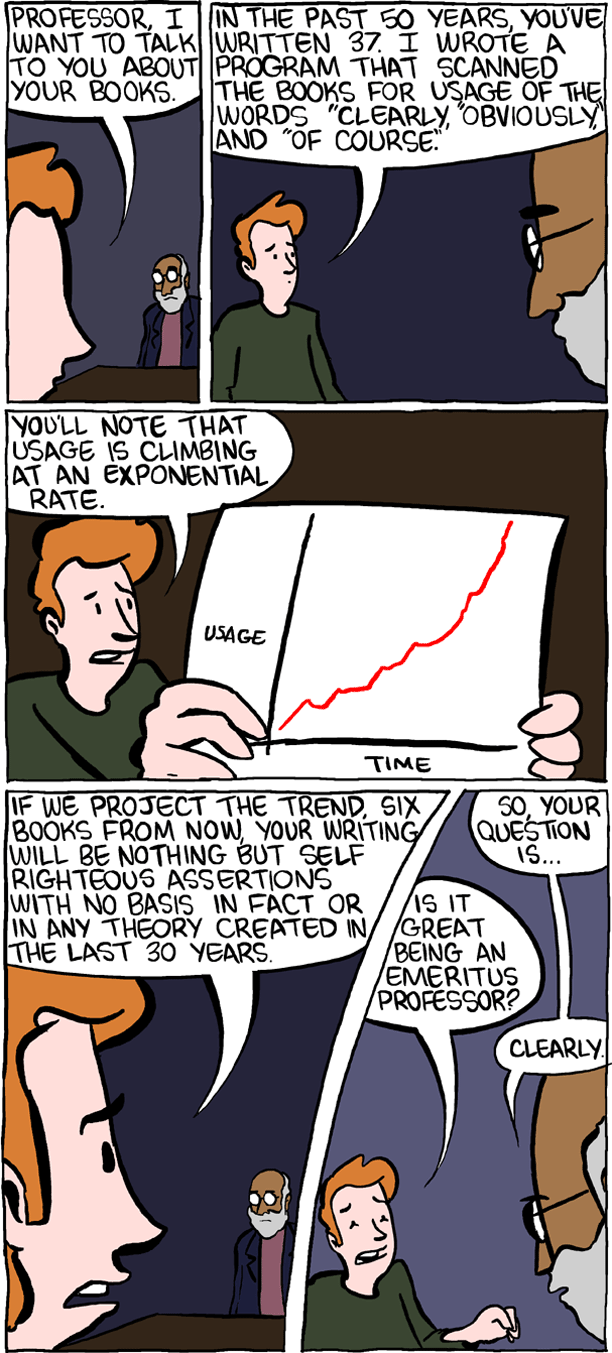Deveno said:
It's hard to divine the intention of an author, unless you are that author.
Furthermore, some people may use such phrases without ANY of the baggage associated with them, in cases where it really IS obvious (like 2+2 = 4 obvious), just to improve narrative flow.
How does that improve narrative flow? This is one writing habit most have and when changed improves texts dramatically, in my opinion.
Deveno said:
"Clearly" probably most fits in with this line of thought: if something previously proved and used several times is NOT clear, the pedagogical failure lies earlier on, not in the use of the word at that time.
Perhaps something like: "details left to the reader" is a more honest approach, the fact there is an omission is acknowledged, but the motive may in fact, be the same.
To give an example: one might say that some specific case "follows by induction on $n$, but omit the actual inductive proof. Is this fair? How can one assess this?
I agree with your second paragraph: "details left to the reader" is more honest. Just as we can't divine authors intentions, we can't divine their motives. Therefore, if both are good or bad, we can't tell. However, from what is written you can have an impression upon you.
An example is just when you have someone you like do something and you said something in the best interest, trying to help, but you end up offending. It was best left unsaid, even if with the greatest intentions/motives.
As for the "follows on induction on $n$", we thread on more dangerous terrain. We both know that there are induction proofs just like
$$\sum_{i=1}^n i = \frac{n(n+1)}{2}$$
and inductions where the base case is easy and the $k \to k+1$ is hell because it requires tricks and nonstandard methods. You can't possibly know unless:
1) You try it yourself, which is often hoped to be encouraged with such phrases;
2) The author tells you so. There is nothing demeaning to say "the proof follows induction at $n$. A rough sketch of important steps is..." You will have to write a couple more lines, but it should be nothing compared to the added clarity of your text plus you are giving the roadmap. Walking the road is always different.
Deveno said:
Nevertheless, the objection IS a valid one. While stylistically, it might seems arrogant, I think it's just a bit presumptuous to assume it was INTENDED so. Teaching (in my humble opinion) works best as a dialogue, the instructor who cannot understand and remedy the difficulties of his/her students is not effective.
Perhaps, Fantini, if you find yourself in the position of making lecture notes, or even a textbook, you can "break with the trend" and find a novel solution to this dilemma. As for myself, I can try to be aware of such considerations when I write, but be warned: my memory isn't what it used to be, and I just might forget :P
I must have given the impression that I thought it was done arrogantly on purpose. I don't. However, that IS how it comes out. I don't read "obvious" and "it is easy to see" and am flattered.
I agree with you that teaching works best as a dialogue, but there's no teaching if there's no learning.
Ken Robinson, a famous educator, mentions a distinction one of his friends used to make. You can be doing something but not really be achieving it. That is to say, you can be teaching, but if people aren't learning then you aren't achieving it. Textbooks authors don't get to know if there is learning going on because they aren't at their side. The dialogue is done through the text. Therefore, it is best to err on the side that it isn't clear.
These are two textbooks I own and hold in high regard as to mathematical exposition, clarity and rigor. I would certainly be happy if you could check them and see if you agree with me.
Mathematical Analysis - A Concise Introduction, Bernd Schröder
Mathematical Methods for Scientists and Engineers - Fourier Analysis, Partial Differential Equations and Calculus of Variations, Kwong-Tin Tang
Special attention goes to Schröder. At the first five chapters he is very careful to guide the reader, such as gray boxes indicating what specific theorems/computations were done at important passages, providing heuristic paragraphs motivating proofs and giving examples while leaving others explicitly for the reader (and saying so). If possible, see for yourself and comment back. :)


